What is a Certified Diamond?
The term “certified diamond” can be misleading. Anybody can sell a diamond with an appraisal certificate, but a diamond certificate is most meaningful if comes from an internationally-recognized independent grading laboratory.
What is a diamond certificate?
A diamond certificate is a piece of paper that lists an individual diamond’s important characteristics like its measurements, shape and “four Cs”.
The four Cs of diamonds — cut, color, clarity and carat — are the characteristics that determine a stone’s value.
Most diamond certificates will list the diamond’s grades in each of the 4 Cs as well as either a photograph or an illustration of the diamond’s dimensions.
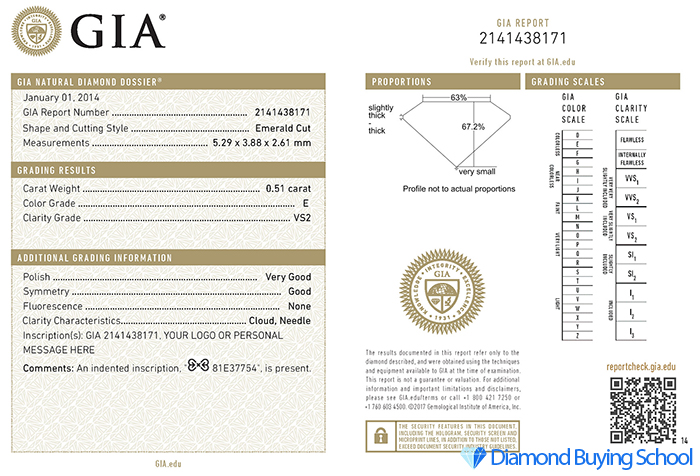
Why is it important to buy a certified diamond?
Essentially, a diamond certificate is an assurance that the diamond you are buying is as described by the jeweler.
Experienced diamond dealers can quickly appraise a diamond on the spot with a jeweler’s loupe and scale. Wholesalers, therefore, “buy the diamond, not the paper”. To them, their own eyes are more important than what a certificate says.
Most consumers are not gemologists. Therefore, we rely upon certificates — and preferably independent grading reports — to provide documentation of a diamond’s authenticity and value.
Reputable jewelry stores are going to advertise that they carry certified diamonds. They will happily show you the certification even before purchasing.
Diamond certificates vs grading reports
All diamond certificates are not created equal. The best diamond certificates are created by independent gemological laboratories and are more appropriately called grading reports rather than certificates.
Gemological grading reports
Before a reputable jeweler lists a diamond for sale, they will send the diamond to an independent grading laboratory for analysis. The grading laboratories have no stake in a diamond’s value — all jewelers pay them the same flat fee for grading a diamond.
The four largest and most recognized independent grading laboratories are the Gemological Institute of America (GIA), the International Gemological Institution, the European Gemological Laboratory (EGL) and the American Gem Society (AGS).
(GIA) Gemological Institute of America: GIA certified diamonds are recognized worldwide as the industry experts in diamond. GIA has over 75 years in service. In addition to their labs, research and education centers, they are considered the godfathers of diamond certification and the original “inventors” of the concept of certified diamonds. One advantage of buying a GIA certified diamond is that in doing so, you can trust that it will be of the highest quality. They also commonly provide more detail on their diamond certifications.
(IGI) International Gemological Institution: Although not as strict as GIA, IGI are less pricey and very comparable in value.
(EGL) European Gemological Laboratory: EGL diamonds are evaluated by two labs (minimum) and use a subjective method of grading. Like IGI diamonds, these diamonds may be lower priced than GIA certified diamonds.
(AGS) American Gem Society: Unlike the aforementioned two, AGS diamonds may be even more stringent than GIA. They offer thorough detail, including a hand plotted illustration of every external and internal blemish or inclusion. Because of their underlying theory, AGS diamonds are most known for their association with grading ideal cut diamonds, which are diamonds specifically cut for brilliance. Many people don’t know that AGS was founded by the very same man who formed GIA, Robert Shipley.
Jeweler appraisal certificates
Some jewelers do not spend the money to have an independent lab issue a grading report for their diamonds. Instead, they sell diamonds with their own appraisal certificates.
These jewelers create their own diamond appraisal certificates. They can then say they are selling “certified diamonds”. But you need to know that a diamond certificate is not the same thing as a grading report from an independent gemological lab.
A diamond is not necessarily lower-quality if it is sold with a store-issued certificate rather than an independent grading report. But you need to be aware of who is providing the certificate.
For example, Tiffany & Co. famously issues its own diamond certificates.
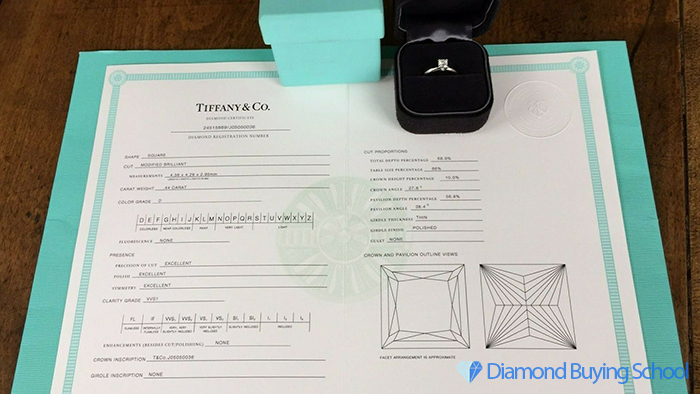
Obviously, Tiffany & Co. is a high-end brand and would not sell poor-quality gems. But theoretically speaking, if you were trying to sell two identical diamonds where one had a Tiffany certificate and the other had a GIA grading report, it’s conceivable a buyer would pay less for the Tiffany diamond and more for the GIA-graded gem.
That’s ironic because, as a consumer, you will pay a significant markup for an identical Tiffany diamond just to get the little blue box!
Where to buy certified diamonds
The best way to be sure you’re getting a diamond with an independent third-party grading report is to buy from a reputable online jeweler that will show you the grading report before you buy.
At Blue Nile, for example, you can view a grading report for most diamonds instantly.
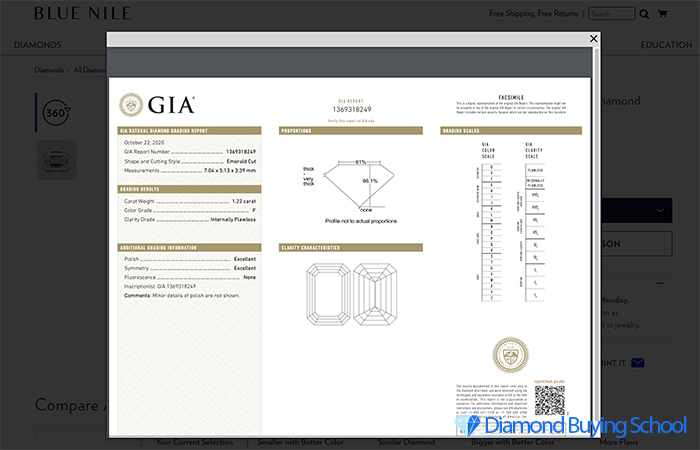
Brilliant Earth also makes it easy to view a diamond’s certificates (and additional details) just below the diamond’s price and 3D images. Brilliant Earth also gives you details about the diamond’s origin.
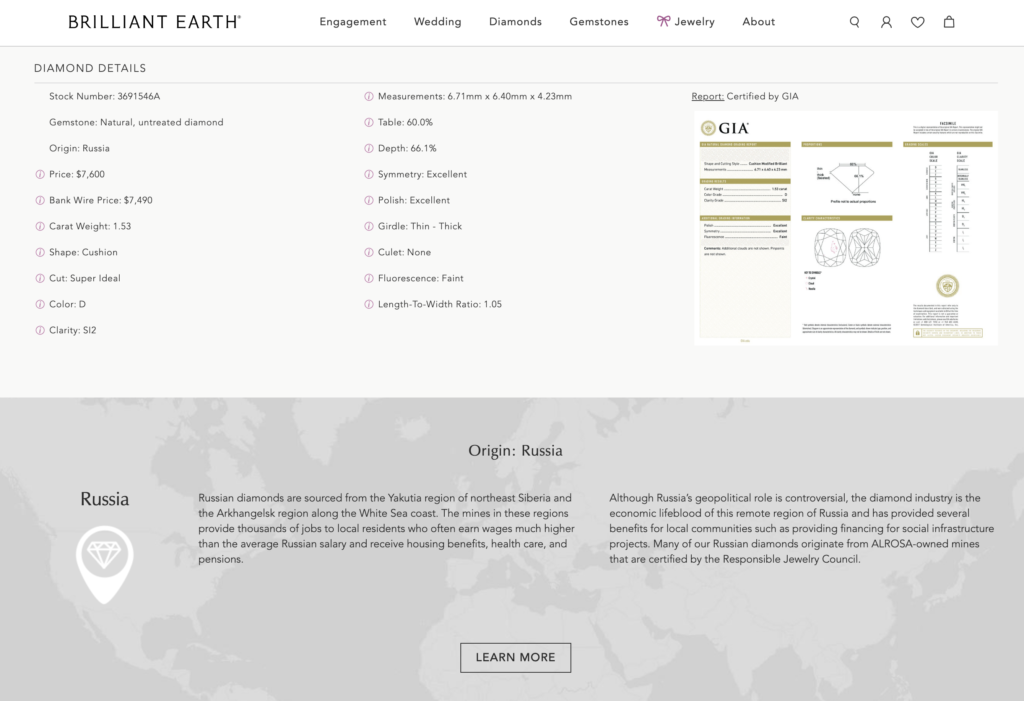
;)
James Allen, another leading online diamond jeweler, makes grading reports available for all of their diamonds — you simply need to contact customer service to let them know which report you want to view.
You will find a wide range of different policies at brick-and-mortar jewelers. Some will provide third-party certificates, some will offer appraisal certificates, and others do not sell certified diamonds.
Summary
A diamond certificate can mean one of two things: A grading report provided by an independent third-party gemological lab or an appraisal certificate created by the jeweler themself.
You can feel most confident about your diamond purchase if it’s accompanied by a third-party grading report. That’s not to say diamonds that come with a jeweler’s appraisal certificate are less valuable than the certificate implies, but you must realize you’re not getting an independent appraisal the way you are with a third-party grading report.
Recommended Jewelers
James Allen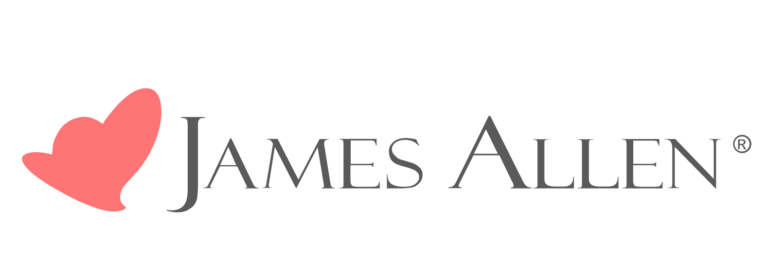
James Allen is the most competitive diamond vendor with more than 150,000 loose diamonds in inventory. They have been a leader in selling diamonds online and pioneered 3D imaging so you can see the exact diamond you're buying in exquisite detail. You'll find it hard to beat James Allen in terms of price or selection. Read our James Allen review. |
Whiteflash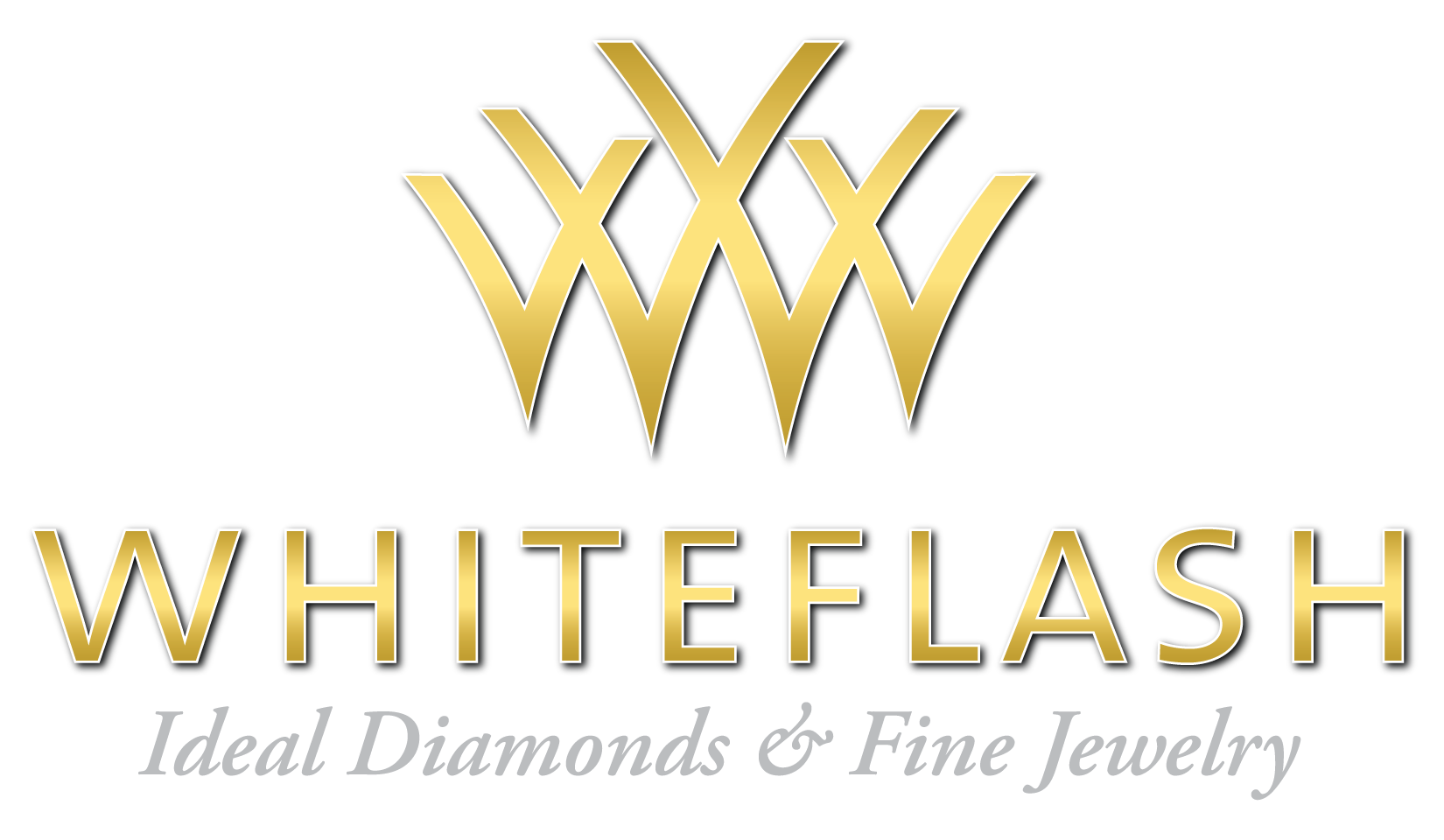
Whiteflash is the home of "A Cut Above" diamonds which are among the best quality round- and princess-cut diamonds in the world. With superior diamond photographs and videos, Whiteflash's diamonds seem to come to life -- even online. Read our Whiteflash review. Shop Whiteflash » |
Brilliant Earth
Brilliant Earth is the global leader in ethically-sourced jewelry. Brilliant Earth goes above and beyond existing standards to offer “Beyond Conflict Free Diamonds” that they select for their ethical and environmentally-responsible origins. With over 120,000 diamonds in inventory, you can be sure to find your perfect diamond and feel good knowing it was responsibly-sourced. Read our Brilliant Earth review. Shop Brilliant Earth » |
Blue Nile
Blue Nile is the world's largest online jeweler. Their reputation for quality and customer service is unparalleled in the industry. Blue Nile offers free shipping, a 30-day return policy and satisfaction guarantee. Read our Blue Nile review. Shop Blue Nile » |